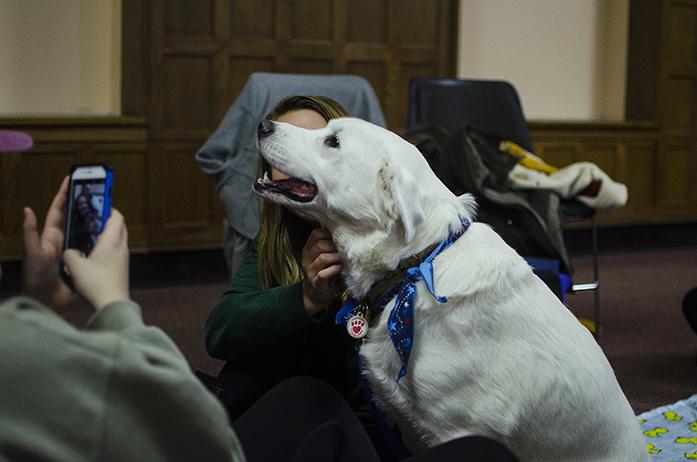There’s been a fair amount of buzz out there about what constitutes service dogs, emotional-support animals, and therapy animals. These animals can help us be healthier both individually and as a community. In 2014, I took an intense course on animal-assisted interactions through the Center for Spirituality and Healing at the University of Minnesota. The course was taught by a great professor, a renown expert in the field, and, most importantly, several therapy horses, dogs, chickens, and bunnies.
I get disheartened when people try to discredit the benefits of animals in our lives, attempt to minimize the importance of animal assistance, or take advantage of animal aid in inappropriate ways.
This past year, there have been a couple of times at a local chain grocery store that I’ve witnessed a person walking a dog into the store and declaring the animal is a “therapy dog,” when obviously it wasn’t.
For example, a puppy isn’t old enough to earn therapy-dog certification. So when a store employee brings in a dog and thinks, “I’ll just say it’s a therapy dog,” it is obvious that the employee is lying. Sadly, this lie does disservice to the animal-assistance world.
So, let’s look at proper terminology of service dogs, emotional-support animals, and therapy animals.
First, a service dog is legally not a pet; it is an animal that provides assistance to or performs tasks for the benefit of a person with a disability. For example, a seeing-eye dog acts as the vision guide for a person who is blind.
The Americans with Disabilities Act clarifies that service dogs do not include emotional-support animals. So, what are those animals? The ADA National Network explains that animal-support animals (or comfort animals) “are often used as part of a medical-treatment plan — These support animals provide companionship, relieve loneliness, and sometimes help with depression, anxiety, and certain phobias, but [they] do not have special training to perform tasks that assist people with disabilities.” To be clear, emotional-suport animals do not perform tasks that assist people with disabilities — that would be the job of an official service dog.
A health-care provider can write a letter to have an animal become an emotional-support animal, and this is where there is room for abuse. In order for people to claim their animal is an ESA, one must have the proper evaluation, paperwork, and authorization from a health-care provider, preferably a provider in psychiatry or psychology, to maximize the ability for the client (and animal) to do well.
A professional needs to be thorough and avoid a quick signature. At my previous job in behavioral health, when clients asked me to sign a paper to be eligible to get an such an animal, I asked them to obtain a counselor’s OK. This ensures that the clients are working with how to cope with their emotional-health issue with and without the animal and that the animals will be properly taken care of. This may seem to be creating barriers. Rather, the method works to quell an excess of inappropriate requests.
There are many other issues that can destroy the validity of emotional-supoort animals. For example, online businesses sell “emotional-support” vests that people can buy and put on their dogs with or without professional authorization — this is abuse of the system. Doing this ruins the practice for others. These online businesses need to be discredited if they do not require proof of professional authorization. Abuse of the emotional-support-animal system can make it harder for those who truly need and who have such animals. Hopefully, over time, things will become more streamlined and consistent.
OK, so what are therapy animals? Although not legally defined by federal law, some states have laws defining such animals. In general, therapy animals provide people with therapeutic contact “to improve their physical, social, emotional, and/or cognitive functioning as well as being a motivation tool.” A pet owner and pet go through testing, coursework, and registration (this takes some money, yet it’s all worth it), and once approved, the animal-therapy team is authorized (and covered by insurance) to provide visits at predetermined levels of complexity. Believe it or not, you can follow a real therapy chicken, Atilla the Hen, @ TherapyChicken — and FYI, Tilly’s preferred pronouns are she, her, hers.
Emma, my registered and insured pet-therapy dog, is another example. We went through a fair amount of time, training, money, and testing to ensure we are a good therapy team, and Emma-the-dog is registered at the high-complexity therapy level. This basically translates to she is a huge mellow blob who thrives on just sitting there even amid chaos. She is a read-to-a-dog dog at local libraries, she has sat many a time with people in their last days of life in hospice, and she is a regular with families in the Iowa City Autism Community.










